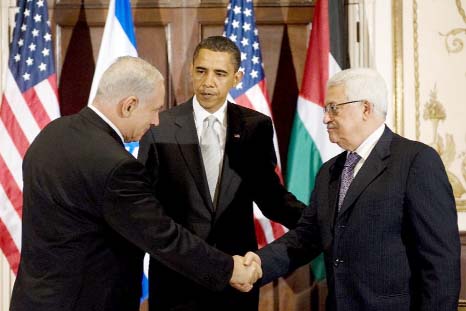
AFP, Sharm el Sheikh :US President Barack Obama is “committed” to a two-state solution for Israel and Palestinians, Secretary of State John Kerry said Saturday on the stalled Middle East peace process.”The position of the United States with respect to our long expressed hope, the Republicans and the Democrats alike (and) many presidents of the last 50 years or more, has always been for peace and President Obama remains committed to a two-state solution,” Kerry said at a news conference in Egyptian resort town of Sharm el-Sheikh.Kerry said that Obama was “hopeful that whatever choice people of Israel make… (they) will be able to move forward on those efforts”.The top US diplomat said he would not like to comment more on the issue only a few days before an Israeli general election.Final opinion polls have put Israeli Prime Minister Benjamin Netanyahu’s rightwing Likud party four seats behind its centre-left rival the Zionist Union for Tuesday’s vote.Palestinians are keen for a change from Netanyahu, hoping for a more suitable partner for future peace talks.On Friday, Kerry held talks on the peace process with Palestinian president Mahmud Abbas, Egyptian President Abdel Fattah al-Sisi and Jordan’s King Abdullah II.The four discussed creating an environment to “push forward the peace process to reach a comprehensive and just peace in the region,” Sisi’s office said after they met.Kerry led a bid last year to try to reach an Israeli-Palestinian peace deal, but his efforts collapsed amid bitter recriminations by both sides.Last month the United States voiced fears the Palestinian Authority may be teetering on the brink of collapse because of a lack of funding, as Israel withholds taxes and donor aid stalls. Israeli security officials have recommended building a barrier along the border with Jordan-the Jewish state’s only frontier that does not yet feature a fence.”Security officials recommended the construction of a security barrier to protect the new airport which will be built at Timna” some 20 kilometres (12 miles) north of resort city Eilat, an army spokeswoman said, without elaborating.Work has already begun on the new airport near Eilat, which lies across the Jordanian border from the port city of Aqaba.Newspaper Haaretz reported that the planned 30-kilometre (19-mile) barrier was designed both to protect the airport and to foil attempts by would-be “jihadist infiltrators” from Jordan, which is home to some extremist sympathisers and a number of radical clerics.It was unclear whether the government would approve construction of the fence. Israel has a fence on its southern border with Egypt, also near Eilat, that was erected in 2013 to keep out illegal African immigrants.The Jewish state also has a border fence with the Gaza Strip and barriers on the frontiers with Syria and Lebanon, both countries it is technically at war with.The huge steel fence that runs along the Syrian frontier through the Israeli-occupied Golan Heights was built after the Syrian civil war broke out, for fear of a spillover of fighting and an influx of refugees.Israel also has a vast separation barrier that runs through the West Bank, which it began building during the second Palestinian intifada, or uprising, which lasted from 2000-2005.Meanwhile, deeply divided and foul of mood, Israelis are headed toward what seems like a referendum on their long-serving, silver-tongued prime minister, the hard-line Benjamin Netanyahu.But with so many of them having despaired of peace talks with the Palestinians, the focus is mostly on Netanyahu’s personality, his expense scandals and the soaring cost of living.And as no candidate is likely to win big in the wild jumble of Israel’s political landscape, the outcome of the March 17 election could well be a joint government between Netanyahu and his moderate challenger Isaac Herzog. It’s an irony, because the animosities are overwhelming. Much has changed in the world since Netanyahu first became prime minister in 1996, but Israel remains stuck with the question of what to do with the highly strategic, biblically resonant, Palestinian-populated lands it captured almost a half-century ago.Israelis know it is their existential issue, but it seems almost too complex for a democracy. After decades of failed peace talks under every sort of government, the whole festering thing has become such a vexation that politicians seem to fear it, and voters look away.

